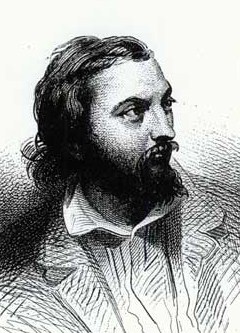
Pierre Dupont
Pierre Dupont (23 April 1821 – 25 July 1870) was a French songwriter. Dupont was born in Lyon as the son of a blacksmith. His mother died before he was five years old, and he was brought up in the country by his godfather, a village priest. He was educated at the seminary of L'Argentière, and was afterwards apprenticed to a notary at Lyon. In 1839 he found his way to Paris, and some of his poems were inserted, in the Gazette de France and the Quotidienne. Two years later he was saved from the conscription and enabled to publish his first volume – Les Deux Anges – through the exertions of a kinsman and of Pierre Lebrun. In 1842 he received a prize from the Academy, and worked for some time on the official dictionary. Gounod's appreciation of his peasant song, Les Bœufs (1846), settled his vocation as a songwriter. He had no theoretical knowledge of music, but he composed both the words and the melodies of his songs, the two processes being generally simultaneous. He himself remained so innocent of musical knowledge that he had to engage Ernest Reyer to write down his airs. He sang his own songs, as they were composed, at the workmen's concerts in the Salle de la Fraternité du Faubourg Saint-Denis; the public performance of his famous "Le chant du pain" was forbidden; "Le chant des ouvriers" (1846) was even more popular; and in 1851 he paid the penalty of having become the poet laureate of the socialistic aspirations of the time by being condemned to seven years of exile from France. The sentence was cancelled, and the poet withdrew for a time from participation in politics. He died at Lyon, where his later years were spent, on 25 July 1870. His songs have appeared in various forms:
Among the best-known are "Le Braconnier", "Le Tisserand", "La Vache blanche", "La Chanson du blé", but many others might be mentioned of equal spontaneity and charm. His later works have not the same merit. |
 = Recordings are available for online listening.
= Recordings are available for online listening.
 = Recordings were issued from this master. No recordings issued from other masters.
= Recordings were issued from this master. No recordings issued from other masters.
Recordings
| Company | Matrix No. | Size | First Recording Date | Title | Primary Performer | Description | Role | Audio |
|---|---|---|---|---|---|---|---|---|
| Victor | C-2353 | 12-in. | 3/1/1905 | Les boeufs | Marcel Journet | Bass vocal solo, with orchestra | composer | |
| Victor | B-19111 | 10-in. | 1/22/1917 | Les boeufs | Marcel Journet | Bass vocal solo, with orchestra | composer | |
| Columbia (U.K.) | WLX963 | 12-in. | 4/3/1929 | Les boeufs | Louis Guénot | Male vocal solo, with instrumental ensemble | composer | |
| Columbia (U.K.) | WL1124 | 10-in. | 6/4/1928 | La chanson de la soie | M. Jacques | Male vocal solo, with piano | composer | |
| Columbia (U.K.) | WL1625 | 10-in. | 5/4/1929 | Les sapins | Armand Bernard ; Louis Guénot | Baritone vocal solo, with orchestra | composer, lyricist | |
| Columbia (U.K.) | WL1951 | 10-in. | 12/13/1929 | La musette neuve | Armand Bernard ; Louis Lynel | Male vocal solo, with instrumental ensemble | composer | |
| Columbia (U.K.) | CL9001 | 10-in. | 6/25/1951 | Les bœufs | Albert Lasry ; Charles Trenet | Male vocal solo, with piano | lyricist |
Citation
Discography of American Historical Recordings, s.v. "Dupont, Pierre," accessed November 8, 2024, https://adpprod2.library.ucsb.edu/names/106510.
Dupont, Pierre. (2024). In Discography of American Historical Recordings. Retrieved November 8, 2024, from https://adpprod2.library.ucsb.edu/names/106510.
"Dupont, Pierre." Discography of American Historical Recordings. UC Santa Barbara Library, 2024. Web. 8 November 2024.
DAHR Persistent Identifier
Linked Open Data Sources
LCNAR: Dupont, Pierre, 1821-1870 - http://id.loc.gov/authorities/names/n92034254
Wikidata: Pierre Dupont - http://www.wikidata.org/entity/Q2735843
VIAF: http://viaf.org/viaf/107534270
MusicBrainz: Pierre Dupont - https://musicbrainz.org/artist/ebcb5a63-6cb4-4522-93b8-0022d3f21fbc
Wikipedia content provided under the terms of the Creative Commons BY-SA license
Feedback
Send the Editors a message about this record.
